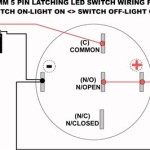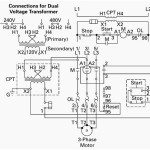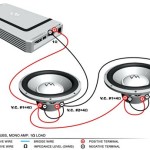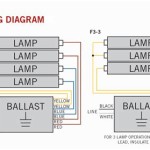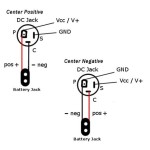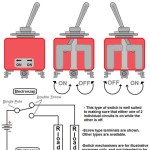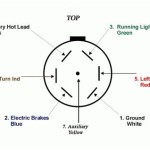A trailer wiring plug is an electrical connector used to establish a secure and reliable connection between a towing vehicle and a trailer. It typically consists of a molded plastic housing containing multiple electrical contacts and a corresponding plug that plugs into the receptacle on the vehicle.
Trailer wiring plugs are crucial for powering the trailer’s lights, brakes, and other electrical systems. They ensure proper communication between the towing vehicle and the trailer, enhancing safety and functionality. A key historical development in trailer wiring plugs was the standardization of 4-pin and 7-pin connectors, facilitating universal compatibility among different types of vehicles and trailers.
This article delves into the technical details, safety considerations, and troubleshooting techniques associated with trailer wiring plugs. It aims to provide comprehensive information for both novice and experienced users to ensure the proper and safe operation of trailers.
Trailer wiring plugs play a vital role in ensuring the safe and reliable connection between towing vehicles and trailers. Understanding their essential aspects is crucial for proper installation, maintenance, and troubleshooting.
- Connector Type: 4-pin, 7-pin, or other specialized types
- Wiring Configuration: Color-coded wires for specific functions (e.g., ground, taillights, brakes)
- Electrical Capacity: Amperage and voltage rating to handle trailer loads
- Durability: Resistance to weather, corrosion, and physical stress
- Safety Features: Grounding and insulation for electrical protection
- Compatibility: Matching between vehicle and trailer connectors
- Installation: Proper mounting and wiring techniques
- Troubleshooting: Identifying and resolving electrical issues
- Maintenance: Regular inspection and cleaning for optimal performance
These aspects are interconnected and crucial for the effective operation of trailer wiring plugs. For instance, choosing the correct connector type ensures compatibility and proper electrical flow. Understanding wiring configuration helps prevent errors and potential electrical hazards. Adequate electrical capacity supports the power demands of trailer systems, while durability ensures reliability in various operating conditions. Proper installation, maintenance, and troubleshooting practices contribute to the longevity and safety of trailer wiring plugs.
Connector Type
Within the realm of Trailer Wiring Plugs, connector types play a crucial role in establishing compatibility and functionality between towing vehicles and trailers. The choice of a specific connector type depends on factors such as the electrical requirements of the trailer, industry standards, and regional regulations.
- Pin Configuration: Trailer wiring plugs are designed with varying numbers of pins, each dedicated to a specific electrical function. The most common types are 4-pin and 7-pin connectors, with specialized types catering to unique requirements.
- Wiring Standards: The pin configuration and wiring colors follow standardized conventions to ensure universal compatibility. This standardization allows for seamless connection and operation of trailers with different towing vehicles.
- Electrical Capacity: Connector types are rated for specific amperage and voltage capacities. Selecting the correct connector ensures adequate power handling for the trailer’s electrical systems, including lighting, brakes, and auxiliary features.
- Durability and Environmental Factors: Connectors are exposed to harsh conditions, including moisture, vibration, and extreme temperatures. Durable materials and construction ensure reliable performance and longevity in various environments.
Understanding the nuances of connector types empowers users to make informed choices, ensuring proper installation, functionality, and safety when connecting trailers to towing vehicles. By matching the connector type to the specific requirements and adhering to industry standards, users can establish reliable electrical connections that support the safe and efficient operation of trailers.
Wiring Configuration
Wiring configuration is a critical aspect of trailer wiring plugs, determining the proper functioning of electrical systems in trailers. Each wire is assigned a specific color code, corresponding to its designated function, such as ground, taillights, brakes, and auxiliary features. This standardization ensures consistent and reliable connections between towing vehicles and trailers.
The color-coded wiring configuration simplifies the installation and troubleshooting process. By adhering to industry standards, manufacturers and users can easily identify and connect the wires to the appropriate terminals on the plug and trailer. This reduces the risk of electrical errors, short circuits, and potential hazards.
For instance, in a 7-pin connector, the brown wire is designated for taillights, the green wire for right turn signals, and the yellow wire for left turn signals. This color-coding allows technicians to quickly identify and connect these wires to the corresponding lights on the trailer. Proper wiring configuration ensures that the trailer’s electrical systems function correctly, enhancing safety and communication on the road.
Understanding the wiring configuration empowers users to perform basic maintenance, troubleshoot electrical issues, and customize trailer wiring to suit specific requirements. It also promotes a universal language among manufacturers, installers, and users, facilitating seamless compatibility and adherence to safety regulations.
Electrical Capacity
Electrical capacity, measured in amperage and voltage, is a crucial aspect of trailer wiring plugs. It determines the ability of the plug to safely and effectively handle the electrical demands of the trailer. Trailers require a reliable power supply to operate their lighting, braking systems, and other electrical components.
The amperage rating specifies the maximum current that the plug can handle without overheating or causing damage. Voltage rating, on the other hand, indicates the maximum voltage that the plug can withstand without electrical breakdown. Selecting a trailer wiring plug with sufficient electrical capacity is essential to prevent electrical failures, fires, and potential hazards.
For instance, a trailer with multiple high-power appliances, such as a refrigerator or air conditioner, will require a plug with a higher amperage rating to accommodate the increased current draw. Similarly, trailers designed for heavy-duty applications, such as construction or industrial use, may require plugs with higher voltage ratings to handle the demands of specialized equipment.
Understanding the electrical capacity of trailer wiring plugs empowers users to make informed choices when selecting and installing these components. It ensures that the plug can meet the specific power requirements of the trailer, preventing overloading and potential damage to the electrical system. Proper electrical capacity also contributes to the overall safety and reliability of the trailer, reducing the risk of electrical malfunctions and ensuring optimal performance on the road.
Durability
Durability, characterized by resistance to weather, corrosion, and physical stress, plays a critical role in the functionality and longevity of trailer wiring plugs. The harsh operating environment of trailers exposes these plugs to a multitude of challenges that can compromise their performance and safety.
Weather conditions, such as rain, snow, and extreme temperatures, can lead to corrosion and damage to the plug’s electrical contacts. Exposure to moisture can cause short circuits and electrical malfunctions, potentially leading to hazardous situations. Robust plugs with corrosion-resistant materials and sealed connections effectively withstand these conditions, ensuring reliable electrical connections.
Physical stress, including vibration, shock, and accidental impacts, is another common challenge faced by trailer wiring plugs. Rugged plugs with sturdy construction and strain relief features can endure the rigors of towing and off-road conditions, preventing damage to the wiring and maintaining proper functionality. High-quality plugs designed for heavy-duty applications provide exceptional durability, ensuring reliable performance even in the most demanding environments.
Understanding the importance of durability in trailer wiring plugs empowers users to make informed choices when selecting and installing these components. Durable plugs contribute to the overall safety and reliability of trailers, reducing the risk of electrical failures and ensuring optimal performance on the road. Proper maintenance and inspection practices, including regular cleaning and protective measures, further enhance the durability and longevity of trailer wiring plugs.
Safety Features
Ensuring the safe and reliable operation of trailer wiring plugs involves implementing robust safety features, including proper grounding and insulation for electrical protection. These measures safeguard against electrical hazards, prevent malfunctions, and contribute to the overall reliability of trailer electrical systems.
- Grounding: An essential safety feature, grounding provides a low-resistance path for electrical current to flow back to the source, preventing voltage buildup and potential shocks. In trailer wiring plugs, grounding is typically achieved through a dedicated grounding wire connected to the trailer’s frame.
- Insulation: Electrical insulation serves as a protective barrier around wires and terminals, preventing contact between conductors and reducing the risk of short circuits and electrical fires. Trailer wiring plugs employ high-quality insulation materials designed to withstand harsh conditions and maintain electrical integrity.
- Surge Protection: Trailer wiring plugs may incorporate surge protection devices to safeguard against voltage spikes and transients that can damage sensitive electrical components. These devices divert excess voltage away from the trailer’s electrical system, protecting against potential damage.
- Weatherproofing: To ensure reliable performance in various weather conditions, trailer wiring plugs are often designed with weatherproof seals and gaskets. These measures prevent moisture and contaminants from entering the plug, reducing the risk of corrosion and electrical malfunctions.
By incorporating these safety features, trailer wiring plugs enhance the overall safety and reliability of trailer electrical systems. Grounding, insulation, surge protection, and weatherproofing work in conjunction to mitigate electrical hazards, prevent damage to components, and ensure the safe and efficient operation of trailers.
Compatibility
Compatibility between vehicle and trailer connectors is crucial for ensuring a secure and functional electrical connection between the towing vehicle and the trailer. Mismatched connectors can lead to electrical problems, safety hazards, and reduced functionality of the trailer’s systems.
- Connector Type: The physical shape and pin configuration of the connectors must match to ensure a proper fit and electrical connection. Common connector types include 4-pin, 7-pin, and specialized connectors for specific applications.
- Wiring Configuration: The colors and arrangement of wires within the connector must correspond between the vehicle and trailer to ensure that each wire is connected to the correct function (e.g., ground, taillights, brakes).
- Electrical Capacity: The connectors must be rated to handle the amperage and voltage requirements of the trailer’s electrical system. Overloading the connectors can lead to overheating and potential fire hazards.
- Durability and Weather Resistance: The connectors should be made of durable materials that can withstand the elements and harsh conditions encountered while towing, including moisture, vibration, and extreme temperatures.
Ensuring compatibility between vehicle and trailer connectors involves selecting the appropriate connector type, wiring configuration, and electrical capacity for the specific application. By adhering to industry standards and carefully matching the connectors, users can establish a reliable electrical connection that supports the safe and efficient operation of the trailer.
Installation
Installation plays a critical role in ensuring the reliability and safety of trailer wiring plugs. Proper mounting and wiring techniques are essential to establish a secure electrical connection between the towing vehicle and the trailer.
- Mounting Location: Choosing the correct mounting location for the plug is crucial. It should be easily accessible, protected from damage, and positioned to prevent strain on the wiring harness.
- Wiring Harness: The wiring harness connects the plug to the vehicle’s electrical system. It should be routed securely, avoiding sharp bends or potential pinch points that could damage the wires.
- Wire Connections: Proper wire connections are vital to ensure a reliable electrical flow. Wires should be stripped, crimped, or soldered using appropriate connectors to create secure and corrosion-resistant connections.
- Grounding: Establishing a proper ground connection is essential for safety. The ground wire should be connected to a clean, unpainted metal surface on the trailer’s frame to provide a low-resistance path for electrical current.
Following these proper installation techniques ensures that the trailer wiring plug is securely mounted, the wiring harness is protected, the electrical connections are reliable, and the ground connection is established to provide a safe and functional electrical system for the trailer.
Troubleshooting
Electrical issues can arise in trailer wiring plugs due to various factors such as wear, corrosion, or improper installation. Troubleshooting these issues is essential for maintaining the reliable operation of the trailer’s electrical system. Here are some key aspects to consider when troubleshooting electrical issues related to trailer wiring plugs:
- Visual Inspection: A thorough visual inspection can reveal loose connections, damaged wires, or corrosion on the plug or wiring harness. Inspecting for physical damage, such as cracks or broken components, can also provide clues to the source of the electrical issue.
- Continuity Testing: Using a multimeter, continuity testing can verify the electrical continuity of the wires in the plug and harness. This test helps identify breaks or shorts in the wiring that may be causing electrical problems.
- Voltage Testing: Voltage testing can determine if power is reaching the trailer wiring plug and if the voltage levels are within the acceptable range. This test can help pinpoint issues with the power supply or wiring connections.
- Ground Fault Detection: A ground fault occurs when an electrical current escapes from the intended path and flows through the ground. Identifying and resolving ground faults is crucial for safety, as they can lead to electrical shocks or fires.
Troubleshooting electrical issues related to trailer wiring plugs requires a systematic approach, involving visual inspection, electrical testing, and analysis of the results. By identifying and resolving these issues, users can ensure the reliable and safe operation of their trailer’s electrical system.
Maintenance
Maintenance is crucial for ensuring the longevity and reliability of trailer wiring plugs, which are essential for establishing a secure electrical connection between towing vehicles and trailers. Regular inspection and cleaning of the plug and its components help prevent electrical issues, premature wear, and potential safety hazards.
- Plug Inspection: Regularly inspecting the plug for physical damage, corrosion, or loose connections can help identify potential issues early on. Checking for broken or bent pins, damaged insulation, or exposed wires ensures timely repairs and prevents electrical malfunctions.
- Contact Cleaning: Cleaning the electrical contacts on the plug and the receptacle on the vehicle removes dirt, debris, and oxidation that can interfere with electrical flow. Using contact cleaner and a soft brush helps maintain a strong electrical connection and prevents voltage drop or intermittent failures.
- Wire Inspection: Inspecting the wiring harness for cuts, abrasions, or loose connections is essential for preventing electrical shorts or breaks. Checking for frayed wires, damaged insulation, or improper splicing can help identify potential hazards and ensure the integrity of the electrical system.
- Ground Connection: The ground connection provides a path for electrical current to flow back to the source. Inspecting the ground wire and its connection point on the trailer’s frame ensures proper grounding, reduces the risk of electrical shocks, and helps prevent damage to the trailer’s electrical components.
By incorporating regular inspection and cleaning into their maintenance routine, users can proactively address potential issues with trailer wiring plugs, extending their lifespan, enhancing electrical performance, and ensuring the safe and reliable operation of their trailers.









Related Posts

